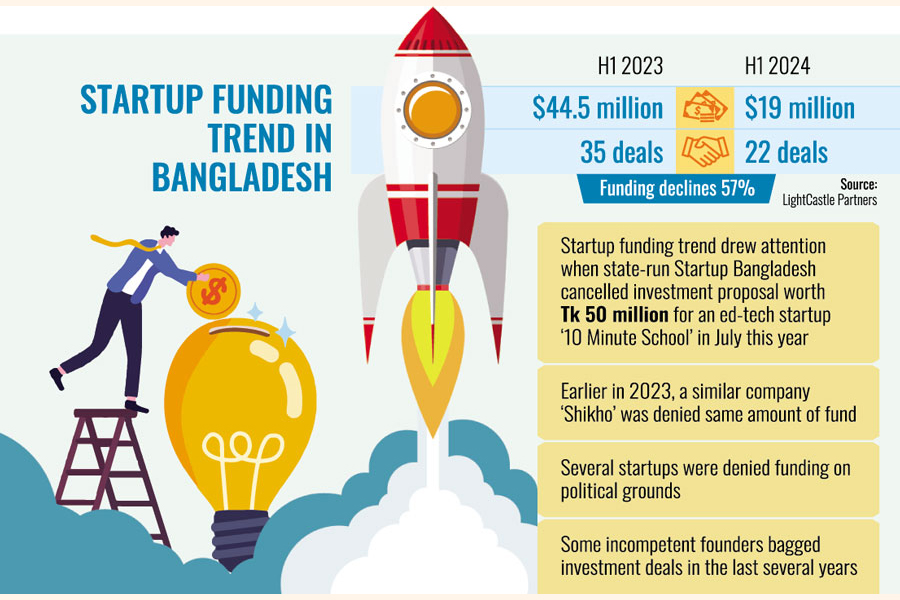Downtrend in startup funding for poor links
Incapacity to follow best practices, limited country branding also to blame

Published :
Updated :

Funding in local startup companies has shrunk in recent times for factors like poor international affiliation of many founders, failure to follow global-standard operations and limited country branding, according to insiders.
The unavailability of a dedicated policy as well as local and global economic slowdown can also be held also liable for this reduction in investment.
However, the recent regime change, which affected some investment though, might help increase funding in the coming days, the sources cited.
During the first six months of 2024, according to available data, local startups have raised US$19 million across 22 deals, which is 57-per cent lower than $44.5 million raised from 35 deals the first six months of 2023, according to data compiled and analysed by local think-tank LightCastle Partners.
Startup funding trends drew much attention when state venture capital farm Startup Bangladesh cancelled an investment proposal worth Tk 50 million for edtech startup '10 Minute School' without showing any excuse this July.
Earlier in 2023, another company 'Shikho' was denied the similar amount.
Preferring anonymity, a founder said several startups, in addition to the mentioned ones, were denied funding on political grounds while some incompetent founders have bagged investment deals over the years.
"Although the regime change has no serious link to a startup's growth, it has paved the way for upholding the country's position in global arena, thanks to the global image of Dr Yunus, the chief adviser to the interim government."
Investors are now taking a cautious policy regarding Bangladesh's position in making investment in not only startup, but also in any business, according to the entrepreneur.
Contacted, 'Shikho' founder and CEO Shahir Chowdhury said the downtrend in investment to the startup was linked to a broader global trend.
"In general, there is a global liquidity shortage in venture capital markets because of a higher interest rate environment," he added.
Talking to the FE, Fahim Mashroor, one of the judges of startup funding-related reality show Shark Tank Bangladesh, said startups were often misunderstood with the concept of small and medium enterprises (SMEs) here.
"A founder must have clear concept of what is he or she doing with the venture," he said, adding that communication, networking and relationship with investors are important factors.
Unlike startups in neighbouring countries, local founders also have to face setbacks like complexities in doing business, said Mr Mashroor, who is also the co-founder of Bdjobs.
There are some globally acclaimed individuals in the interim government who can make good contribution to bring in new investors in Bangladesh using their capacities, according to him.
Founding partner and CEO of Anchorless Bangladesh, a New York-based early-stage venture capital fund, Rahat Ahmed said maintaining global standard in every aspect of the startup ecosystem was crucial.
"The startup ecosystem needs a reset for it to successfully move forward. We need to focus on quality, not quantity, and we must not bring changes in global standard practices for local conveniences."
Local startup founders have not operated at global standards for a long duration, said Mr Rahat, adding that the ecosystem insists on defining its own terms that do not align with the rest of the world.
"As a result, our founders aren't taken as seriously abroad as their regional peers. Countries like Indonesia, Vietnam and Pakistan have seen exceptional growth by holding each other accountable on terminology, investor engagement, and even how they answer simple emails."
Underscoring the need for quality, Mr Rahat said: "We don't need 1,000 startups-we need 25 that are transformative for the country."
Terms like'venture capital' should be used according to their global definitions. Misuse of these terms and a lack of understanding by fund managers have burned so many local investors and dampened the way people think about startups. "No one has been more negatively impacted by this than entrepreneurs-whether they're running startups, SMEs or social enterprises," said Mr Rahat.
saif.febd@gmail.com


 For all latest news, follow The Financial Express Google News channel.
For all latest news, follow The Financial Express Google News channel.